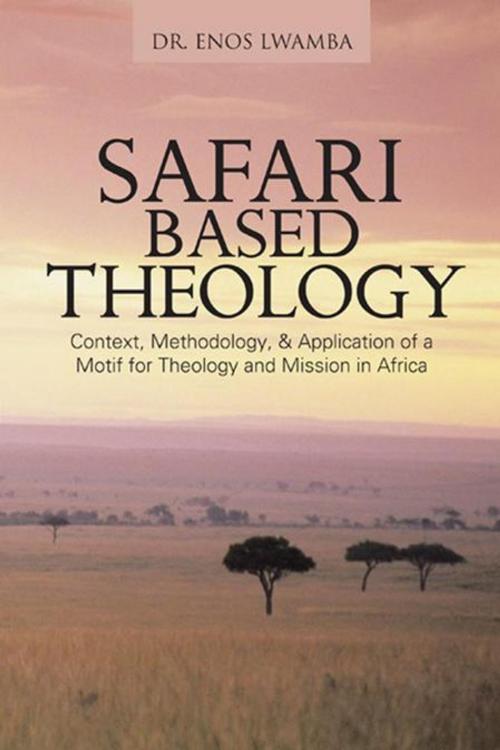Safari Based Theology
Context, Methodology, & Application of a Motif for Theology and Mission in Africa
Nonfiction, Religion & Spirituality, Inspiration & Meditation, Spirituality, Reference & Language, Education & Teaching, History| Author: | Dr. Enos Lwamba | ISBN: | 9781477288412 |
| Publisher: | AuthorHouse | Publication: | December 21, 2012 |
| Imprint: | AuthorHouse | Language: | English |
| Author: | Dr. Enos Lwamba |
| ISBN: | 9781477288412 |
| Publisher: | AuthorHouse |
| Publication: | December 21, 2012 |
| Imprint: | AuthorHouse |
| Language: | English |
In Safari-based Theology Dr. Enos Lwamba has developed an approach to theology and mission based on his proposed safari motif for the development of theology and mission. Based on his Ph.D. dissertation: The Safari Motif in the Development of Theology in Africa, Dr. Lwamba argues that God has used a series of divine redemptive safaris in the Bible to reveal Himself progressively to people. The author develops his proposed motif around a tri-dimensional conception of reality and time and explores a threefold aspect of the safari: mwanzo, sasa, and mwisho, which provide keys to the African mindset. He explores the various meanings and uses of the safari idea from both a biblical and theological perspective. In addition to the literal safaris, journey is an analogy of the church and believers are on a divine safari, individually and collectively. The safari model highlights the absolute necessity of the biblical message and the contextual situation to help Christians live effective and fruitful lives in society now and in future. Inspired by both John Mbitis The African Concept of Time and Paul Hieberts The Flaw of the Excluded Middle, the author utilizes biblical, theological, historical, and contextual sources to make his point. In the philosophical aspect of the safari, the author develops his notion of an African conception of time modeled on the cultural safari idea which he relates to development of theology and mission. He refutes the western influenced or commercially based notion that safari refers to a game hunting or tourist expedition to Africa. Dr. Lwamba promotes the argument that the philosophical framework and methodology drawn from the safari approach provides a more effective way of doing theology and mission in Africa and other contextual situations. He also draws parallels to the safari concept from such sources as Augustines City of God, John Bunyans The Pilgrims Progress and others in a refreshing and original style that the reader will find engaging. The motif provides interpretational and practical application tools as it harmonizes the unity of the biblical message. Its practical appeal makes Safari-Based Theology a must read for Christians and others interested in their daily journey of faith. The author contends that just as the idea of logos described the mindset, conception of divine truth, and aspirations of the Greek mind, the concept of safari does the same for the African. This book is highly recommended for pastors, missionaries, and teachers, as well as students of Bible and theology, culture and missions, and other related disciplines.
In Safari-based Theology Dr. Enos Lwamba has developed an approach to theology and mission based on his proposed safari motif for the development of theology and mission. Based on his Ph.D. dissertation: The Safari Motif in the Development of Theology in Africa, Dr. Lwamba argues that God has used a series of divine redemptive safaris in the Bible to reveal Himself progressively to people. The author develops his proposed motif around a tri-dimensional conception of reality and time and explores a threefold aspect of the safari: mwanzo, sasa, and mwisho, which provide keys to the African mindset. He explores the various meanings and uses of the safari idea from both a biblical and theological perspective. In addition to the literal safaris, journey is an analogy of the church and believers are on a divine safari, individually and collectively. The safari model highlights the absolute necessity of the biblical message and the contextual situation to help Christians live effective and fruitful lives in society now and in future. Inspired by both John Mbitis The African Concept of Time and Paul Hieberts The Flaw of the Excluded Middle, the author utilizes biblical, theological, historical, and contextual sources to make his point. In the philosophical aspect of the safari, the author develops his notion of an African conception of time modeled on the cultural safari idea which he relates to development of theology and mission. He refutes the western influenced or commercially based notion that safari refers to a game hunting or tourist expedition to Africa. Dr. Lwamba promotes the argument that the philosophical framework and methodology drawn from the safari approach provides a more effective way of doing theology and mission in Africa and other contextual situations. He also draws parallels to the safari concept from such sources as Augustines City of God, John Bunyans The Pilgrims Progress and others in a refreshing and original style that the reader will find engaging. The motif provides interpretational and practical application tools as it harmonizes the unity of the biblical message. Its practical appeal makes Safari-Based Theology a must read for Christians and others interested in their daily journey of faith. The author contends that just as the idea of logos described the mindset, conception of divine truth, and aspirations of the Greek mind, the concept of safari does the same for the African. This book is highly recommended for pastors, missionaries, and teachers, as well as students of Bible and theology, culture and missions, and other related disciplines.















